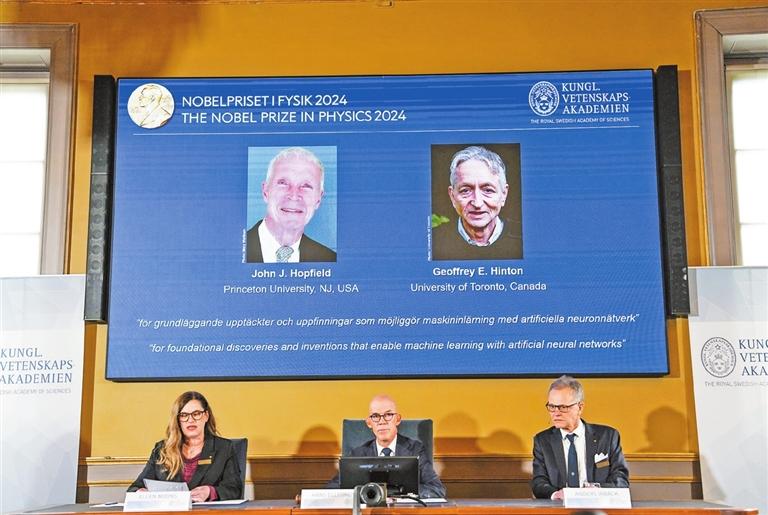
A CANADIAN scientist who once warned artificial intelligence (AI) “might take over” if not developed responsibly joined a Princeton University professor in winning the Nobel Prize in physics Tuesday. The awarders of the prize, the Nobel committee at the Royal Swedish Academy of Sciences, said the two winners — John Hopfield and Geoffrey Hinton, known as the “godfather of artificial intelligence” — helped create the building blocks of machine learning. AI is revolutionizing work but also poses new threats to humanity, Hinton said. Ellen Moons, a member of the Nobel committee at the Royal Swedish Academy of Sciences, said the two laureates “used fundamental concepts from statistical physics to design artificial neural networks that function as associative memories and find patterns in large data sets.” She said that such networks have been used to advance research in physics and “have also become part of our daily lives, for instance in facial recognition and language translation.” While the committee honored the science behind machine learning and AI, Moons also mentioned its flipside, saying that “while machine learning has enormous benefits, its rapid development has also raised concerns about our future. Collectively, humans carry the responsibility for using this new technology in a safe and ethical way for the greatest benefit of humankind.” Hinton shares those concerns. He quit a role at Google so he could more freely speak about the dangers of the technology he helped create. Hinton, a citizen of Canada and Britain who works at the University of Toronto, predicted that AI will end up having a “huge influence” on civilization, bringing improvements in productivity and health care. “It would be comparable with the Industrial Revolution,” he said in the open call with reporters and the officials from the Royal Swedish Academy of Sciences. “Instead of exceeding people in physical strength, it’s going to exceed people in intellectual ability. We have no experience of what it’s like to have things smarter than us. And it’s going to be wonderful in many respects,” Hinton said. “But we also have to worry about a number of possible bad consequences, particularly the threat of these things getting out of control.” Hopfield is a Swarthmore College alumnus who received his PhD from Cornell University. At Princeton, he is the Howard A. Prior Professor in the Life Sciences, emeritus and an emeritus professor of molecular biology. He also holds positions in physics and neuroscience. Hopfield, who left Princeton for Caltech in 1980, developed the “Hopfield network,” an artificial neural network that can find and store patterns in information in a way that mimics the brain. "Thanks to their work from the 1980s and onward, John Hopfield and Geoffrey Hinton have helped lay the foundation for the machine learning revolution that started around 2010," the Nobel committee said. Nobel announcements continue with the chemistry physics prize Wednesday and literature Thursday. The Nobel Peace Prize will be announced Friday and the economics award Oct. 14.(SD-Agencies) | 
